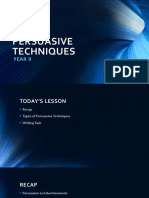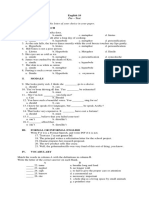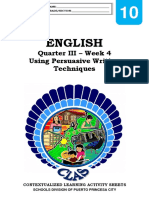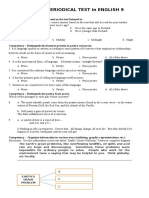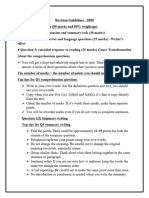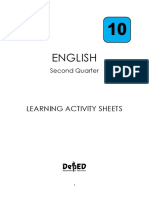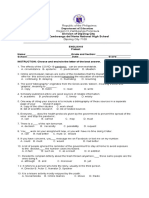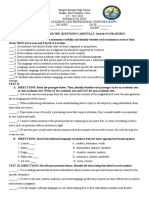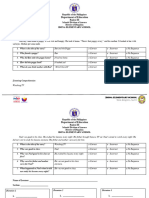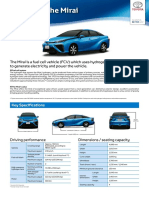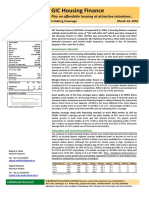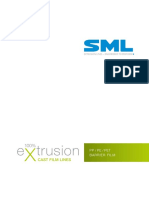TAKE ACTION
Unit 3 Lesson 4
AGENDA
1.) Sharpen Your Skills: Prefixes
2.) Persuasive Language Review
3.) Writing: My Pledge
1
� VOCABULARY
spooky (adj) strange and frightening
party (n) organisation of people who share the same political views
legacy (n) long-lasting impact of a particular event or action
to inherit (v) to receive something from someone after they have died e.g money or property
debate (n) formal discussion or argument about a particular topic
politician (n) someone whose job involves politics
authoritative (adj) showing that you’re confident, in control, and expect to be respected and obeyed
pledge (n) something that you give as a sign that you will keep a promise
to captivate (v) to hold the attention of someone or an audience by being extremely interesting, excited or
charming
musky (adj) smell that is strong, warm, and slightly sweet
VOCABULARY
spooky
musky party
to legacy
captivate
pledge to
inherit
authoritative politician debate
2
� SHARPEN YOUR SKILLS
A prefix is a group letters that can be added to the
front of a word to change its meaning.
Textbook page 143
SHARPEN YOUR SKILLS
Adding un- to the front of a word means the opposite.
important vs unimportant
Textbook page 143
3
� SHARPEN YOUR SKILLS
Adding pre- to the front of a word makes it mean earlier
or before.
precook = to cook in advance
Textbook page 143
SHARPEN YOUR SKILLS
Adding re- to the front of a word makes it mean
back or again.
rerun = to run something again
Textbook page 143
4
� SHARPEN YOUR SKILLS
Adding mis- to the front of a word makes it mean
wrong or bad.
misguide= to be guided wrong
Textbook page 143
SHARPEN YOUR SKILLS
In your workbook, you will find
eight sentences with a gap that
needs to be filled.
Choose the correct prefix and write
it in the gap of the sentence. You
will use each prefix more than
once.
5
� SHARPEN YOUR SKILLS
WORDS WITH PREFIX UN-
• unhappy
• unlock
SHARPEN YOUR SKILLS
WORDS WITH PREFIX PRE-
• preheat
• preschool
6
� SHARPEN YOUR SKILLS
WORDS WITH PREFIX RE-
• refill
• reheat
SHARPEN YOUR SKILLS
WORDS WITH PREFIX MIS-
• mislead
• mismatch
7
� PERSUASIVE WRITING
Can you remember all of the techniques from Unit 2?
PERSUASIVE WRITING
• emotive language
• imperative verbs
• personal pronouns
• positive language
• superlatives
8
� PERSUASIVE WRITING
But we also have two literary
techniques from Unit 1 that
can also be persuasive writing
techniques.
Can you remember?
PERSUASIVE WRITING
• alliteration
• repetition
9
� RHETORICAL QUESTIONS
Rhetorical questions are
questions that are asked to
make a point rather than to
get an answer.
A rhetorical question may
have an obvious answer, one
which the person asking it
probably already knows.
RHETORICAL QUESTIONS
Rhetorical questions are
asked for effect with no
answer expected. This is
because they are used to
make a point.
10
� RHETORICAL QUESTIONS
Rhetorical Question Effects:
1.) To emphasise an idea
2.) Make the listeners think
about a certain topic
3.) Engage the audience
Rhetorical Question Example:
A mother tells her child that the cake
she made is for after dinner. She
leaves the kitchen. When she comes
back, a large piece of it is missing. In
anger and disbelief she says, "Are
you kidding me?"
The mother doesn't want a
response. Instead, she is making a
point of her anger and disbelief.
11
� TRIPLING (RULE OF 3)
Tripling is a list of three things.
It can be objects, adjectives,
characters, facts, etc.
Studies show that three is the
perfect number. We like
patterns and often find them
quickly. Three is the smallest
number required to make a
pattern.
TRIPLING (RULE OF 3)
Tripling Effects:
1.) It's very memorable
2.) It's engaging
12
� Tripling Examples:
• Reduce, Reuse, Recycle
• The house was old, musky, and
scary.
• Come to my cat café! Pet some
adorable cats, drink a delicious
coffee, and relax in the peaceful
atmosphere.
ZINKERS!
We are going to play a game
to review our 9 persuasive
writing techniques!
The class will be split into
two teams.
13
� ZINKERS!
Teams will take turns
answering questions. If you
answer the question
correctly, you will get to
draw a point card.
You may draw 5, 10, 25, 50,
or 100 points per question!
ZINKERS!
BUT...you might draw a point
card that says, "ZINKERS!"
If you draw a ZINKERS card,
you lose ALL of your points.
Are you ready to play?
14
�ZINKERS!
1.) Which of these is an example
of alliteration?
a) Alice's seashells
b) The cowboy caught a cactus
c) I ate a nice bowl of ravioli
ZINKERS!
1.) Which of these is an example
of alliteration?
a) Alice's seashells
b) The cowboy caught a cactus
c) I ate a nice bowl of ravioli
15
�ZINKERS!
2.) Which one is the superlative?
c) fast
b) faster
c) fastest
ZINKERS!
2.) Which one is the superlative?
c) fast
b) faster
c) fastest
16
�ZINKERS!
3.) Which description of the haunted
house uses emotive language?
a) The house is old, brown and dirty.
b) The horrifying house had dead trees
and spooky bats.
c) This is the oldest house on the street.
ZINKERS!
3.) Which description of the haunted
house uses emotive language?
a) The house is old, brown and dirty.
b) The horrifying house had dead trees
and spooky bats.
c) This is the oldest house on the street.
17
�ZINKERS!
4.) Which technique would you
most likely find in a recipe?
a) imperative verbs
b) positive language
c) repetition
ZINKERS!
4.) Which technique would you
most likely find in a recipe?
a) imperative verbs
b) positive language
c) repetition
18
�ZINKERS!
5.) Which technique is this picture
an example of?
a) positive language
b) repetition
c) tripling
ZINKERS!
5.) Which technique is this picture
an example of?
a) positive language
b) repetition
c) tripling
19
�ZINKERS!
6.) Which of these is a rhetorical
question?
a) Do you want a snack?
b) Can I go home?
c) Do you want to save money?
ZINKERS!
6.) Which of these is a rhetorical
question?
a) Do you want a snack?
b) Can I go home?
c) Do you want to save money?
20
�ZINKERS!
7.) Which of these is a personal
pronoun?
a) they
b) you
c) our
ZINKERS!
7.) Which of these is a personal
pronoun?
a) they
b) you
c) our
21
�ZINKERS!
8.) Which of these is NOT an example of
tripling?
a) We need to buy milk, cheese and bread.
b) He drew his sword and waited for the
attack.
c) The cookies were yummy, delicious and
tasty.
ZINKERS!
8.) Which of these is NOT an example of
tripling?
a) We need to buy milk, cheese and bread.
b) He drew his sword and waited for the
attack.
c) The cookies were yummy, delicious and
tasty.
22
�ZINKERS!
9.) Which sentence uses positive
language?
a) You didn't do the homework? I can't
believe you!
b) I can't focus right now, I didn't sleep
well.
c) I'm so excited for this weekend.
ZINKERS!
9.) Which sentence uses positive
language?
a) You didn't do the homework? I can't
believe you!
b) I can't focus right now, I didn't sleep
well.
c) I'm so excited for this weekend.
23
� ZINKERS!
10.) What technique is this character an
example of?
a) alliteration
b) repetition
c) positive language
ZINKERS!
10.) What technique is this character an
example of?
a) alliteration
b) repetition
c) positive language
Princess Peach
24
�ZINKERS!
11.) What technique does this movie
poster use?
a) imperative verbs
b) tripling
c) repetition
ZINKERS!
11.) What technique does this movie
poster use?
a) imperative verbs
b) tripling
c) repetition
25
�ZINKERS!
BONUS QUESTION:
Which LITERARY technique does this
movie title use?
a) onomatopoeia
b) simile
c) personification
ZINKERS!
BONUS QUESTION:
Which LITERARY technique does this
movie title use?
a) onomatopoeia
b) simile
c) personification
26
�ZINKERS!
12.) What is this picture an example
of?
a) imperative verbs
b) rhetorical question
c) emotive language
ZINKERS!
12.) What is this picture an example
of?
a) imperative verbs
b) rhetorical question
c) emotive language
27
� WHAT PRICE OUR PLANET?
We are going to read an
extract from a speech made
by Charles Kennedy MP in
2004.
The purpose of this speech is
to persuade the audience
that the Liberal Democrat
party cares about the
environment.
Textbook page 144
WHAT PRICE OUR PLANET?
We know people are concerned about the kind of world our
children will inherit, and they are worried about the legacy we
are creating for them.
It is not that people don't care about the environment, but
people often see the environment as a huge issue affecting the
planet, almost too huge, not something they themselves can
directly affect.
28
� WHAT PRICE OUR PLANET?
We need to bring the environmental debate into local
communities, and right into people's daily lives. Not by
ignoring the big issues like climate change, but by bringing
home to people just how affected they are by the environment
on their doorstep.
Being green is about the decisions we take on the things we
buy and even how we carry them home. It is about local
planning decisions, taken by local people, in local town halls. It
is about the place we work in--the creation of emissions by the
companies we work for, and the products we produce.
WHAT PRICE OUR PLANET?
And ultimately, it is about our Government being willing to take
tough decisions at home and convince other governments
across the globe to take those though decisions too.
Challenging behaviour in the home, challenging the behaviour
of your businesses, and challenging the behaviour of
governments on this international stage.
29
� WHAT PRICE OUR PLANET?
1.) What is the purpose of this speech? Choose one
or more of the words in the 'Purpose Bank'.
Purpose Bank
• Persuade, Argue, Advise
• Inform, Explain, Describe
• Analyse, Review, Comment
WHAT PRICE OUR PLANET?
1.) What is the purpose of this speech? Choose one
or more of the words in the 'Purpose Bank'.
Purpose Bank
• Persuade, Argue, Advise
• Inform, Explain, Describe
• Analyse, Review, Comment
30
�WHAT PRICE OUR PLANET?
2.) Who do you think
might be Charles
Kennedy's target
audience for this speech?
WHAT PRICE OUR PLANET?
2.) Who do you think
might be Charles
Kennedy's target
audience for this speech?
Adults and possibly
other politicians or party
supporters
31
�WHAT PRICE OUR PLANET?
3a) How would you
describe the language
Charles Kennedy uses in
this speech?
WHAT PRICE OUR PLANET?
3a) How would you
describe the language
Charles Kennedy uses in
this speech?
Formal language
32
�WHAT PRICE OUR PLANET?
3b) How does this choice
of language suit his
purpose and audience?
WHAT PRICE OUR PLANET?
3b) How does this choice of
language suit his purpose
and audience?
A speech is authoritative
and serious, which makes
the audience realise that
the content is important
and should be listened to.
33
�WHAT PRICE OUR PLANET?
4) Using the chart in your
workbook, try to identify
examples of persuasive
language in the speech.
WHAT PRICE OUR PLANET?
Alliteration:
What examples did you find?
34
�WHAT PRICE OUR PLANET?
Alliteration:
• Possibly also argue and
advise.
• but by bringing home
• products we produce
WHAT PRICE OUR PLANET?
Personal Pronouns:
What examples did you find?
35
�WHAT PRICE OUR PLANET?
Personal Pronouns:
• we know people are
concerned
• how we carry them home
• products we produce
WHAT PRICE OUR PLANET?
Emotive Language:
What examples did you find?
36
�WHAT PRICE OUR PLANET?
Emotive Language:
• tough decisions
• challenging behaviour
WHAT PRICE OUR PLANET?
Repetition:
What examples did you find?
37
�WHAT PRICE OUR PLANET?
Repetition:
• people
• local
• home
• challenging
• behaviour
WHAT PRICE OUR PLANET?
Tripling:
What examples did you find?
38
�WHAT PRICE OUR PLANET?
Tripling:
• It is about local planning
decisions, taken by local
people, in local towns.
WHAT PRICE OUR PLANET?
Tripling:
• It is about the place we
work in--the creation of
emissions by the
companies we work for,
and the products we
create.
39
�WHAT PRICE OUR PLANET?
Rhetorical Questions:
What examples did you find?
WHAT PRICE OUR PLANET?
Rhetorical Questions:
• What price our planet?
40
� WRITING
Today you will be writing
a pledge about two
actions or changes you
can start making in order
to help clean up Ho Chi
Minh City.
WRITING
For this task, think about
small things you can do in
order to make a
difference starting today.
Can you think of any ideas?
41
� EXAMPLES YOU CAN USE
• pick up trash you see on the ground
• bring your own bag to the supermarket
• reduce, reuse, recycle
• walk or bike more
• eat your left overs
• turn off the lights when you leave a room
• buy a reusable water bottle
WRITING
Complete the planning
questions in your
workbook and you write
two short P-E-E paragraphs.
Do you remember what P-E-E stands for?
42
� WRITING
POINT
EVIDENCE
EXPLAIN
WRITING
Paragraph 1: write about the
first action or change you are
going to make.
Paragraph 2: write about the
second action or change you
are going to make.
43
� DIRECTIONS
1.) Use the planning questions in your workbook to
choose two actions or changes you can start making
today to help clean up Ho Chi Minh City.
2.) Write two short P-E-E paragraphs about your
choices and how you are going to do them.
Remember to use persuasive writing techniques!
HOW TO DELIVER A SPEECH
What is the difference
between reading and
delivering?
44
� HOW TO DELIVER A SPEECH
Reading: saying the
words on the paper
Delivering: making the
words more captivating
and memorable
HOW TO DELIVER A SPEECH
• use variations in speed (fast and slow)
• use variations in volume (loud and soft)
• try to look up from your paper to look at the audience
• be interested in what you're talking about
45
� LET'S TRY IT
Don't be nervous!
Today you will only practise
by delivering your pledge to
a partner.
Take turns reading in groups
of 2-3.
VOCABULARY TASK
Complete the gaps in your WB with words from the list.
1.) The ____ smell made me think of home.
2.) There is a house on the corner of the street that is very
____.
3.) My mom’s ____ is her famous chocolate chip cookies.
4.)He left his car as a ____ that he would return with the
money.
5.) The ____ will give a speech in my city tomorrow.
46
� VOCABULARY TASK
Complete the gaps in your WB with words from the list.
1.) The musky smell made me think of home.
2.) There is a house on the corner of the street that is very
spooky.
3.) My mom’s legacy is her famous chocolate chip cookies.
4.)He left his car as a pledge that he would return with the
money.
5.) The politician will give a speech in my city tomorrow.
PLENARY
Fill in the rest of the following sentences:
1.) The two things I pledged were…
2.) The difference between reading and delivering is…
3.) One way to deliver a speech is to…
47
